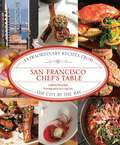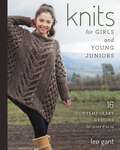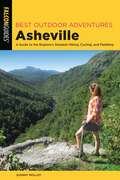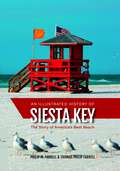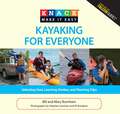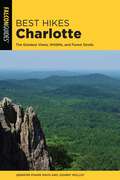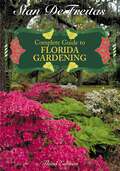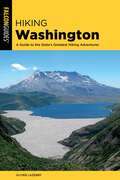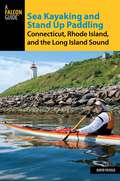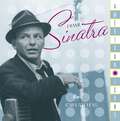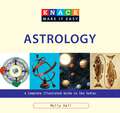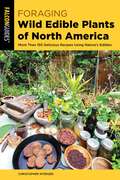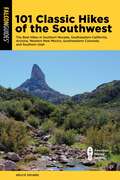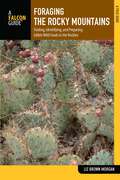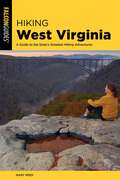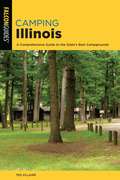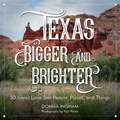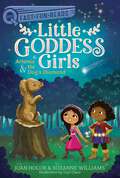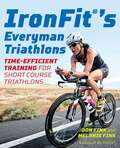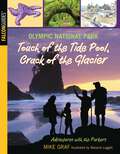- Table View
- List View
San Francisco Chef's Table: Extraordinary Recipes from the City by the Bay (Chef's Table)
by Carolyn JungVery few areas in the world offer more diversity than the San Francisco Bay Area, a place that is without a doubt, “foodie central.” One reason for the major influx of the finest chefs and their restaurants here is perhaps twofold. First, the resident foodies love to eat out, not to mention the 16 million tourists that also visit here with food at the top of their to-do list. The second reason is perhaps the fact that the Bay Area offers chefs an incomparable proximity to fresh, local, and organic ingredients with which to cook, which anyone who cooks can tell you make all of the difference in the end result. With recipes for the home cook from over 50 of the area's most celebrated eateries and showcasing over 200 full-color photos featuring mouth-watering dishes, famous chefs, and lots of local flavor, San Francisco Chef's Table is the ultimate gift and keepsake cookbook for both tourists and locals alike.
Knits for Girls and Young Juniors: 17 Contemporary Designs for Sizes 6 to 12
by Lee GantKnitting is finding a new generation of enthusiasts. More and more kids of all ages are interested in knitting and creating their own special clothing and accessories.Finally! A collection of knits for girls and teenagers that suits their relaxed, comfortable, style! From high-textured cabled ponchos and sweaters to stockinette tops and dresses to warm, comfy coats, these pieces all share a carefree style your girls will love.Sized from 6 to young juniors 12, the patterns reach an often-missed generation of girls between toddler and adult. Yes, this age group can be tricky to please, so get them involved! Let them choose the pattern, the yarn, the fit (body-skimming or looser), and especially the color(s). Encourage them to personalize their design with the choices they make. Once exposed to the joy of creating a unique piece of hand-made clothing, they may even want to learn to knit for themselves!
Best Outdoor Adventures Asheville: A Guide to the Region's Greatest Hiking, Cycling, and Paddling
by Johnny MolloyWho says you have to travel far from home to go on a great hike, paddle, or bike ride? Best Outdoor Adventures Asheville details forty of the best hikes, paddles, and bike routes within an hour&’s drive of the Land of the Sky (along with extra information on climbing and camping adventures), perfect for the urban dweller and suburbanite who may be hard-pressed to find great outdoor activities close to home.
Illustrated History of Siesta Key: The Story of America's Best Beach
by Thomas Philip Farrrell Philip M. FarrellA history of a very popular beach destination near Sarasota on the Gulf coast of Florida. Reviewing the past century of Siesta Key development in the context of Florida's ancient and recent emergence, this book explains how one small Gulf coast barrier island has become world famous as &“#1 Beach in the USA." Beginning with Amerindian settlers, the &“First Floridians," all of the seminal pioneers and a steady stream of pivotal leaders are described with emphasis on their families, motivations, and challenges. Both historical triumphs and tragedies are covered to provide a balanced perspective. Lastly, the current and future threats are analyzed in detail, including the environmental controversies with nearby keys, the menace of increasing red tide, and the risks of rising sea levels associated with global warming.
Knack Kayaking for Everyone: Selecting Gear, Learning Strokes, and Planning Trips (Knack: Make It Easy)
by Bill Burnham Mary BurnhamKnack Kayaking for Everyone is the most visually driven and yet informative guide to every aspect of an aquatic sport whose popularity has skyrocketed in recent years. The first chapters comprise an idea-packed buying guide to kayak design, kayak features, accessories, and gear. The book then presents step-by-step information on transporting, launching and landing, basic and advanced strokes, techniques, navigation, rescues, and expedition planning. In addition, it fully explores recreational (flatwater) kayaking, whitewater kayaking, and sea kayaking, providing instructions for each. Ideas for fun and games and special paddlers (children, the elderly, the handicapped) are also included, as are chapters on weather and first aid.
A Maine Artist's Garden Journal
by Loretta KrupinskiNoted marine and children's-book artist Loretta Krupinski found that she had to relearn many of her gardening skills when she moved from Connecticut to coastal Maine. A practical gardener, she kept notebooks of what she learned. Her garden journal, with its superb watercolor illustrations, both instructs and delights.
Best Hikes Charlotte: The Greatest Views, Wildlife, and Forest Strolls
by Johnny Molloy Jennifer Pharr DavisWho says you have to travel far from home to go on a great hike? In Best Hikes Charlotte veteran hikers Jennifer Pharr Davis and Johnny Molloy offer the absolute best hikes in the greater Charlotte area. Each featured trail is perfect for the urban and suburbanite hard-pressed to find outdoor activities close to home. This guide leads you up mountains, over creeks, and through forests to the best outdoor adventures around Charlotte:Discover the gorgeous views at Crowders Mountain where Kings Pinnacle rises high above the Charlotte skyline.Explore the family-friendly Jetton Park Trail with its beaches, picnic areas, and scenic trails.Experience America&’s past at the Kings Mountain National Military Park and the Reed Gold Mine State Historic Site.Every chapter includes up-to-date hike specs, a brief hike description, directional cues, and a detailed map.
Unisex Sweaters to Knit: Timeless Designs for Sizes 32–52 Inches
by Clarissa SchellongDiscover the joy of knitting with 16 timeless sweater designs that fit beautifully and invite endless customization, ensuring everyone can enjoy a perfect, stylish knit!Everyone should have the pleasure of knitting and/or wearing a sweater that fits well and looks fantastic. And with the 16 designs in this book, you'll have a whole range of options, from comfy textured pullovers to classic aran styles to work-ready cardigans—in sizes ranging from 31.5 to 51 inches in chest circumference. These sweaters are classic yet interesting designs that never go out of style. Change colors, length, buttons, and details to personalize the look. Sweaters range from more fitted designs to loose oversize fits and are sure to please!Pattern skill levels range from intermediate and up, though an illustrated tutorial section of stitches and techniques will help the advanced beginner and others learn any new skills needed. You will turn to this book again and again to fill your sweater chest with instant classics!
Wildflowers of the Blue Ridge Parkway: A Pocket Field Guide (Wildflowers in the National Parks Series)
by Rob Simpson Ann SimpsonThis field guide dedicated to wildflowers of the Blue Ridge Parkway is an information-packed, pocket-sized book that introduces park visitors to the vibrant wildflower habitats along the Blue Ridge Parkway in a colorful and portable package. Including full-color photos and easy-to-understand descriptions, the wildflowers are arranged by color and family to aid in quick identification. With full cooperation from the park association, this book will appeal to the 16 million visitors who travel the Blue Ridge Parkway every year.
Complete Guide to Florida Gardening
by Stan DeFreitasMore comprehensive than ever, the Complete Guide to Florida Gardening explains in step-by-step fashion how to create one's own personal outdoor paradise. Addressing the needs of gardening notvices, seasoned hobbyists, and horitculture professionals alike, Stan DeFreitas has, once again, created a reference book that no Florida gardener should be without.
Liberty: Don Troiani's Paintings of the Revolutionary War
by The Museum The Museum of the American RevolutionUsing a masterful combination of &“artistry and accuracy&” (New York Times),nationally renowned historical artist Don Troiani has dedicated much of his career to transforming the modern understanding of what the Revolutionary War truly looked like. His research-based paintings capture the reality and drama of crucial moments such as the 1775 Battle of Bunker Hill, General Washington&’s daring 1776 attack on Trenton, and the American and French victory at Yorktown in 1781.Liberty: Don Troiani&’s Paintings of the Revolutionary War, the book that serves as catalog for the exhibit of Troiani&’s work at the Museum of the American Revolution, highlights the most pivotal events of America&’s fight for independence and reveals Troiani&’s research-based artistic process. For the first time in a museum, this special exhibition brings together over forty of Troiani&’s original Revolutionary War paintings and pairs them with forty artifacts from his personal collection, that of the Museum, and several private collectors. https://www.amrevmuseum.org/exhibits/liberty-or-death-don-troiani-s-paintings-of-the-revolutionary-warThe exhibit and the book unveil Troiani&’s latest canvas, a painting of the young African American sailor and Philadelphian James Forten witnessing Black and Native American troops in the ranks of the Continental Army as they march past Independence Hall on their way to Yorktown, Virginia.The painting was commissioned in 2019 by the Museum with funding provided by the Washington-Rochambeau Revolutionary Route National Historic Trail of the National Park Service. The exhibit will be open from October 16, 2021 to September 5, 2022.
Hiking Washington: A Guide to the State's Greatest Hiking Adventures (State Hiking Guides Series)
by Oliver LazenbyLace up your boots and sample more than fifty hikes in spectacular Washington, with its densely forested trails, abundant wildlife, lush foliage, and hundreds of miles of cascading streams. Inside this new edition you&’ll find up-to-date trail information, detailed maps, and clear directions from major access points, as well as information on nearby lodging, restaurants, and events. Whether you&’re a day-tripper or long-distance hiker, old hand or novice, you&’ll find traisl suited to every ability and interest throughout Washington state.Look inside to find:Hikes suited to every abilityMile-by-mile directional cuesDifficulty ratings, trail contacts, fees/permits, and best hiking seasonsAn index of hikes by category, including easy day hikes and hikes to waterfallsInvaluable trip-planning information, including local lodging and campgroundsFull-color photos throughout
Sea Kayaking and Stand Up Paddling Connecticut, Rhode Island, and the Long Island Sound
by David FasuloThe kayak touring, stand up paddling, and kayak fishing along the Connecticut and Rhode Island coast is some of the finest in the country. Most of these waters are protected from large ocean swells, while ocean currents allow for lively waters and abundant sea life. These conditions permit beginners and experts alike to explore the many islands, coastal preserves, and dramatic coastlines in Long Island Sound, Fishers Island Sound, Block Island Sound, and Narragansett Bay. Along with over 100 photographs, Sea Kayaking and Stand Up Paddling Connecticut, Rhode Island, and the Long Island Sound provides readers with over 40: Kayak tours, and rough water play areas, for the beginner and advanced paddlerPreferred areas for Stand Up Paddlers Kayak fishing areas and tipsMaps with overviews of the paddling circuits and launchesUtilizing the author&’s vast knowledge of these waters, Sea Kayaking and Stand Up Paddling Connecticut, Rhode Island, and the Long Island Sound is an exceptionally comprehensive resource for all car-top boaters in this region.
American Icons: Frank Sinatra
by Stonesong PressThe American Icons series celebrates the people, places, and objects that have informed American popular culture over the last 75 years. Illustrated throughout and replete with anecdotes, fun facts, and informative sidebars.American Icons: Frank Sinatra celebrates the legendary crooner who defined American music, class, and style for a generations. From his early years during the swing era to his solo career and time with the famous Rat Pack, this book explores the colorful, exciting life of Ol' Blue Eyes.
Knack Astrology: A Complete Illustrated Guide to the Zodiac (Knack: Make It Easy)
by Molly HallChock-full of useful interpretations of signs, planets in signs, aspects, and synastry, it ensures that readers will come away with a sufficient understanding of astrological charts to begin creating their own.
Foraging Wild Edible Plants of North America: More than 150 Delicious Recipes Using Nature's Edibles (Foraging Series)
by Christopher NyergesEdible wild plants are nature&’s natural food source, growing along roadsides, sprouting in backyards, and blooming in country fields. North America&’s diverse geography overflows with edible plant species. From alyssum to watercress, chicory to purslane, Foraging Wild Plants of North America provides everything you need to know about the most commonly found wild greens with over 200 mouth-watering recipes. Fully revised and updated, this full-color field and feast guide with images to the most common edible wild plants is the ideal companion for hikers, campers, and anyone who enjoys eating the good food of the earth. Look inside to find recipes such as:Stirfry AmaranthYellow Pollen PancakesChickweed DeluxeNettle SoupRoot Coffee Earth BreadCattail StewFennel CrunchPrickly Pear Ice Cream
101 Classic Hikes of the Southwest: The Best Hikes in Southern Nevada, Southeastern California, Arizona, Western New Mexico, Southwestern Colorado, and Southern Utah
by Bruce GrubbsFocusing on the best hikes in the four corner states, 101 Classic Hikes of the Southwest will take readers on an adventure across Arizona, Nevada, Utah, and New Mexico. Look Inside to Find:Full-color photosAccurate directions to the trailheadDetailed trail descriptions, and GPS-compatible trail mapsDifficulty ratings, elevation gains, and more for every featured hike
Foraging the Rocky Mountains: Finding, Identifying, and Preparing Edible Wild Foods in the Rockies (Foraging Series)
by Liz Brown MorganThe Rocky Mountain region's diverse geography overflows with edible plant species. From salsify to pearly everlasting, currants to pine nuts, Foraging the Rocky Mountains guides you to 85 edible wild foods and healthful herbs of the region. This valuable reference guide will help you identify and appreciate the wild bounty of the Rocky Mountain states. This guide also includes::detailed descriptions of edible plants and animalstips on finding, preparing, and using foraged foodsrecipes suitable for the trail and at homedetailed, full-color photosa glossary of botanical terms
Hiking West Virginia: A Guide to the State's Greatest Hiking Adventures (State Hiking Guides Series)
by Mary ReedFrom rugged Appalachian ridges to verdant river valleys, this guide details fifty of the very best hiking trails in the state. Inside you'll find detailed maps, mile-by-mile trail descriptions, backpacking tips, and informative details about landmarks and natural history.
Camping Illinois: A Comprehensive Guide To The State's Best Campgrounds
by Ted VillaireThe complete guide to car camping in Illinois. Fully updated and revised, this guide details information on public campgrounds accessible by car. It's a guide for everyone from tenters to RVers.
Texas Bigger and Brighter: 50 Iconic Lone Star People, Places, and Things
by Donna Ingham Paul PorterFrom blue bells to armadillos and the San Antonio River Walk to Cadillac Ranch, here's the inside story about the very things that give the state its character. Did you know that Texas has more bird species than any other state? That Texas is the largest producer of oil and gas in the United States and the nation's leader in pickup sales? That Texas has museums and larger-than-life statues that honor native sons and daughters such as Lyndon B. Johnson, Barbara Jordan, Buddy Holly, and J. Frank Dobie?
Artemis & the Dog's Diamond: A QUIX Book (Little Goddess Girls #12)
by Joan Holub Suzanne WilliamsArtemis and Orion help each other on their quests in this twelfth Little Goddess Girls story—part of the Aladdin QUIX line!Artemis is on the final quest to bring the last missing jewel—a diamond—back to Zeus. She ends up in the Forest of Lost and Found, where she meets a young hunter named Orion. He&’s looking for something, too: a dog! With some extra magic and the power of friendship, can Artemis and Orion both find what they are looking for?
IronFit's Everyman Triathlons: Time-Efficient Training for Short Course Triathlons
by Melanie Fink Don FinkCompleting IronFit&’s &“triathlon trilogy&” alongside Be IronFit and IronFit Secrets for Half Iron-Distance Success, this is a &“go-to,&” time-efficient training guide for the Standard and Sprint-distance triathlons, which are the most accessible and achievable distances for time-crunched athletes. The Standard Distance is the original triathlon configuration: a 1.5 km swim, 40 km bike, and 10 km run (0.9 mile swim, 24.8 mile bike, and 6.2 mile run). The Sprint Distance usually includes a 750 meter swim, 20 km bike, and 5 km run (Half mile swim, 12.4 mile bike, and 3.1 mile run). And there are duathlon equivalents of both triathlon races. These Short Course distances are the &“everyman&” races of the sport, and Don and Melanie Fink offer their time-efficient IronFit® training approach to them here in this book.
Olympic National Park: Touch of the Tide Pool, Crack of the Glacier (Adventures with the Parkers)
by Mike GrafEach book in the Adventures with the Parkers series for kids 8-13 takes the Parker family to a popular national park and is packed with adventure as well as interesting facts about park activities, natural history, outdoor safety, and much more. All books have been vetted and approved by park officials and park associations. Each book includes color illustrations and photographs.
West Point Atlas for The Great War
by Thomas E. Griess*** OVER 210,000 WEST POINT MILITARY HISTORY SERIES SETS IN PRINT ***World War I marked the end of the old military order and the beginning of the era of mechanized warfare. This is a thorough examination of the campaigns of the &“war to end all wars.&” It analyzes the development of military theory and practice from the prewar period of Bismark&’s Prussia to the creation of the League of Nations.
